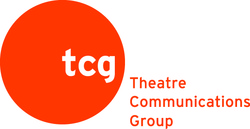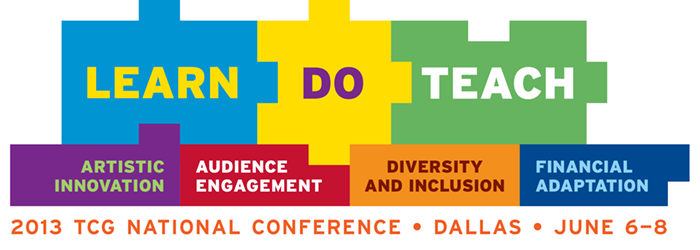 This post is a part of the Diversity & Inclusion blog salon that I led as part of the 2013 TCG National Conference: Learn Do Teach in Dallas. I am re-posting it here on my blog: Day Three of the conference is one that I’ll never forget. It was a hard day. I was taken to a deep, raw and honest place. I wasn’t ready for it. I wasn’t ready for how powerful and emotionally charged it turned out to be. At the same time, I should have seen it coming. It was not only inevitable, it was necessary for deep growth and lasting change to take place. I spent the morning processing my thoughts and typing my notes from the day before. I finished with moments to spare, but ended up missing the morning Diversity and Inclusion Learning Session and purely for selfish reasons. The day before, I learned from my dear friend, Jojo Ruf (General Manager, National New Play Network) that there was a Starbucks in her hotel. This was music to my ears, because I’d been craving a soy chai latte all week. Now, my hotel had a Peet’s Coffee, which it turns out Jojo happens to prefer over Starbucks. So, we made arrangement to buy each other’s caffeinated beverage of choice and in doing so, I was able to attend an Artistic Innovation Learning Session. But this was great; after all, I am a playwright! Living the Margo Jones Legacy: Breaking the Habit of New Play Development The speakers were Anne Cattaneo (Dramaturg and Director, Lincoln Center Theater Directors Lab), Anthony Clarvoe (Playwright, Edgerton Foundation), Ben Kryosz (Artistic Director, Nautilus Music-Theater), Jason Loewith (Artistic Director, Olney Theatre Center), Lisa Adler (Co-Artistic/Producing Director, Horizon Theatre Company) and Mara Isaacs (Producing Director/Founder, McCarter Theatre Center/Octopus Theatricals). The focus of the conversation was to examine ways in which the new play sector could continue to grow and support playwrights:
What I appreciated most about this session was the discussion around the trajectory of some of our more established playwright’s careers. It never hurts to be reminded that Arthur Miller, Christopher Durang, Sam Shepard and Tennessee Williams had to hone and shape their creative voices and artistic visions. These giants of the American Theatre grew into the playwrights they have become. It was a process that took time, faith and risk … three things the American Theatre needs to reinvest its energy and passion in. I’m glad to have had the opportunity to sit in on this conversation and meditate on my craft. In truth, I think it contributed to what made being a part of the next session so relevant, passionate and urgent. Diversity and Inclusion Homeroom, Session #3: Smashing the Glass Ceiling This session moderated by Carmen Morgan (Director, Leadership Development in Interethnic Relations) with panelists Jennifer Bielstein (Managing Director, Actors Theatre of Louisville; Vice President and Member of Diversity Task Force, LORT) and Teresa Eyring (Executive Director, TCG). Together, Teresa and Jennifer outlined the ways in which LORT and TCG were hoping to work together to build bridges and work more efficiently and intently towards a more Diverse and Inclusive American Theatre. LORT: Jennifer Bielstein LORT, as a management association, comprised a task force of managers from the pool of current LORT managers, to engage more deeply in its commitment to diversity and inclusion. The task force interviewed almost 20 people of color and recruiters in the field from LORT and outside – and the input from those interviews is what has shaped their process and thinking:
Jennifer ended her presentation with a great question and one that was asked across the conference: once you’ve set this as your goal, how do you measure success? What does it look like? TCG – Teresa Eyring For the past 52 years, TCG has had a long history and commitment to diversity that began in the early stages of the organization’s development. In fact, earlier movements are echoed in the current energy of growing the organization; specifically in terms of staff, board, grant making and publications. But what are the current challenges? Teresa said, “We have the opportunity to model a new world, rather than replicating existing weaknesses in society—such as institutional racism.” TCG wants to help facilitate change over time: Diversity and Inclusion Six Point Plan
Teresa and Jennifer then wanted to hear thoughts and questions from all of us. Carmen brilliantly and respectfully facilitated this conversation. These are the major issues that were raised:
In the midst of all of this, it hit me why these same conversations were being had over and over again and why no real change has occurred…just as there is the belief that audiences won’t come out to see plays written by or about people of color, there is a core belief that people of color are not qualified for executive level management or artistic positions. This is why people of color are constantly being told that we need training, professional development and special programs. I couldn’t take it. I stood up and shared my thoughts. I shared them through tears, deep sorrow and pain, and I can’t thank TCG enough for creating such a safe space for this place of raw truth to be shared. After I sat down, Carmen then asked us all to take a moment to reflect on what had just been shared. After which, two more young leaders of color shared their thoughts and experiences, which mirrored my own. They had gone through and successfully completed special fellowships, training programs and professional development for artists and administrators of color, but still professional opportunities were not being made available to them. Here’s the thing: these programs are essential. I mean, had Blake Robison (former Artistic Director of Round House Theatre/current Artistic Director of Cincinnati Playhouse), not nominated me as a TCG Young Leader of Color last year, I would never have been able to attend the TCG Conference last year. More than paying for housing, transportation, and the conference fees, the YLC program made me visible and gave me a sense of empowerment. Even though there was a loss of funding, TCG made it possible for many of us to attend the conference this year. As I said, this was a powerful day. I’m not the same for it and I’m grateful to everyone in that room and everyone who participated in the Diversity and Inclusion Arc for giving so much of themselves and for sharing so honestly where they are in their journeys. None of this work is easy, but that’s what makes it so necessary. I’m curious to hear from others who took part in this session or any of the sessions. Your experiences and perspective are essential. I’d love to hear your thoughts on these questions and any of the issues address over the course of the day. If you're interested in joining TCG's online year-round conference community, check out Conference 2.0.
0 Comments
Your comment will be posted after it is approved.
Leave a Reply. |
My BlogI'm a playwright, dramaturg, and teaching artist. It is here where you'll find my queries and musings on life, theater and the world. My posts advocate for diversity, inclusion, and equity in the American Theatre and updates on my own work. Please enjoy!
Categories
All
Archives
June 2020
Reading List
|

